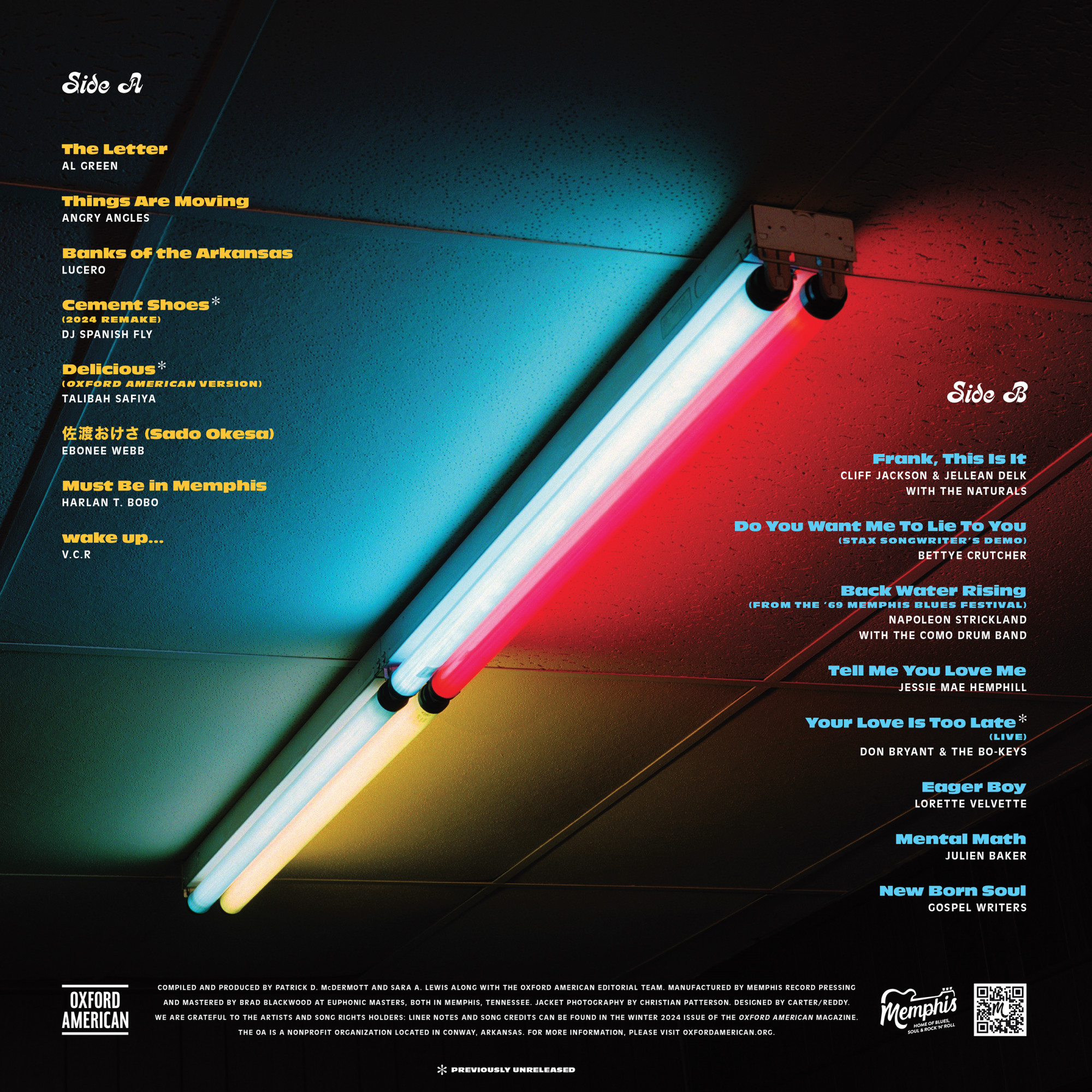Memphis Music LP: Credits & Liner Notes
By Oxford American
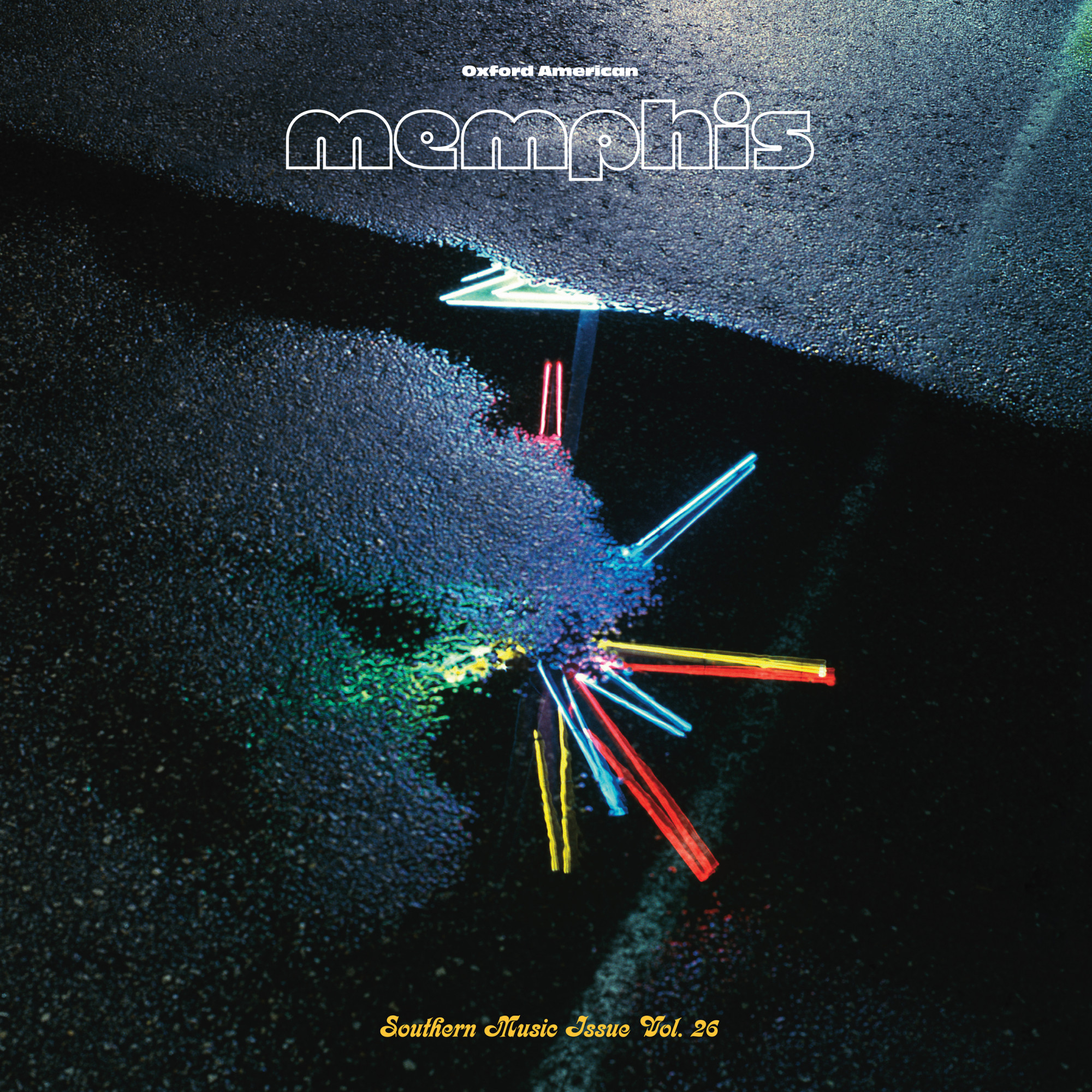
The Memphis Music Issue LP was compiled and produced by Patrick D. McDermott and Sara A. Lewis along with the Oxford American editorial team. It was manufactured by Memphis Record Pressing and mastered by Brad Blackwood at Euphonic Masters, both from Memphis, Tennessee. It was designed by Carter/Reddy, with jacket photography by Christian Patterson. We are grateful to the artists and song rights holders; we have credited them here.
Click here to order the magazine and limited-edition vinyl
Side A

Al Green, ca.1973 © United Archives GmbH/Alamy
The Letter
AL GREEN
“Track four of Green Is Blues is a cover of a hit record by another Memphis outfit, released two years prior: the Box Tops’ ‘The Letter,’ which features a then-sixteen-year-old Alex Chilton singing lead. On Green’s version, horns are added, as well as soulful backing vocals. Chilton’s gruff yearning for his baby is replaced by Green’s plaintive pleading for his own. Like in ‘Back Up Train,’ the protagonist is dying to see his lover and mass transit is involved. Only in ‘The Letter,’ a train, even a fast one, won’t reunite him with his beloved soon enough. Although in both instances percussion brings the listener into the song, in Green’s version, the song is slowed down considerably. The lamentation is a groove. Over the course of nearly two minutes and thirty seconds, Green’s lonely agony increases rapidly. By the end, he’s doubled the “listen mister” of the original into ‘listen to me mister, listen to me mister.’ Instead of singing the word ‘yeah,’ Green instead treats listeners to his signature, toe-curling screams...” (Read the extended liner note.)
—ELLE PERRY
WRITER: Wayne Carson Thompson
PUBLISHING: Wayne Carson Music (BMI), administered by Bluewater Music Services Corp.
PERFORMED BY: Al Green
℗ 1969 Fat Possum Records-Hi Records
Courtesy of Fat Possum Records-Hi Records

Angry Angles (Jay Reatard, left; Alix Brown, right) perform during the Horizontal Action Blackout at the Empty Bottle, Chicago, IL, May 2006. Photograph by Mark Murrmann
Things Are Moving
ANGRY ANGLES
“Things Are Moving” is both an overture and coda. Co-written by duo Jay Reatard and Alix Brown, the song marked the end of both their relationship and their musical collaboration, Angry Angles. It was also one of the last songs Reatard would record with any band before his meteoric rise as a solo artist. The couple broke up, Angry Angles fell apart, and “Things Are Moving” would linger for a decade in bardo before it was released on Goner Records’ 2016 Angles retrospective album. (Read Andria Lisle’s profile of Jay Reatard.)
But as much as the song is an epilogue—to a love, a band, a chapter of a career—it was also a prologue to the success of Reatard’s breakout album Blood Visions. It’s easy to hear in “Things Are Moving” a premonition of ascent. Part of this temptation is visceral; the song’s irresistible velocity presses heart to spine like a plane in takeoff. But to read the song as prophetic would risk an imposition of hindsight: “Things Are Moving” is the opposite of prophecy. Rather, it’s an articulation of the vertigo of locating ourselves or each other in relation to a world that is also in flux. “I don’t think that I do know / And do not ask me why,” Reatard sings. “Things are moving around me all the time.” How can we know arrival from departure, he seems to ask, when each forms a vanishing point?
WRITERS: Jimmy Lee Lindsey, Alix Brown
PUBLISHING: Third Side Music, Inc. / Street Hassle
PERFORMED BY: Angry Angles
Courtesy of Goner Records

Lucero photograph by Mason Pearson
Banks of the Arkansas
LUCERO
Lucero formed in Memphis in the late ’90s, part of the beer-soaked alt-country boom that saw the start of Son Volt, Drive-By Truckers, and Old 97’s, among others. Since then, the band has rarely left the road, becoming beloved staples of barroom stages across the South and beyond. “Banks of the Arkansas,” buried in the middle of their 2001 self-titled album, is a board-stomper that interpolates the traditional dance tune of the same name with a chorus made from another dance tune, “Wave the Ocean.” Maybe the band heard Alan Lomax’s recordings of Arkansan singer Neal Morris—on Lomax’s Sounds of the South, Morris’s performances of both tunes appear on the same track. Lucero adds lyrics and replaces Morris’s Ozark charm with a Memphis dive bar energy, speeding up the dance set into a frantic, punky minute and forty seconds. The transformation shows off the shit-kicking sensibility that characterizes the band’s early catalog: lead singer Ben Nichols (brother of film director Jeff Nichols) growls and whines over Roy Berry’s relentless bass drum, while Brian Venable pulls wolf whistles out of his guitar. Even out of its natural habitat of clinking glasses and drunken laughter, the track has an infectious good humor, the spirit of a Friday night that Lucero is still soundtracking today.
WRITER: Ben Nichols
PUBLISHING: Empty Road Music (ASCAP), administered by Kobalt Songs Music Publishing
PERFORMED BY: Lucero
Courtesy of Liberty & Lament
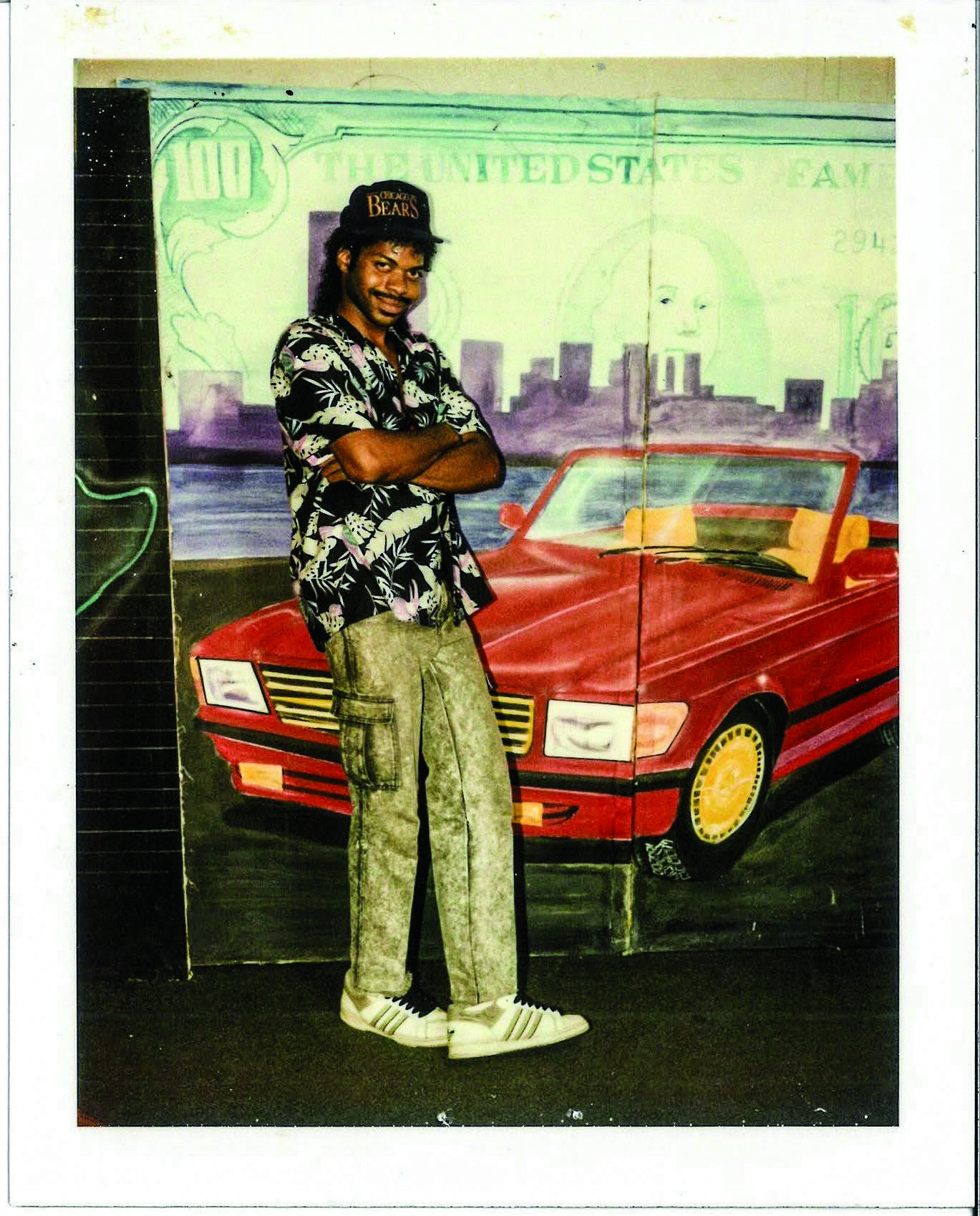
DJ Spanish Fly photograph courtesy DJ Spanish Fly
Cement Shoes (2024 Remake)
DJ SPANISH FLY
“Cement Shoes,” the most-streamed single from legendary godfather of Memphis rap DJ Spanish Fly, is a minimalist attempt at capturing the landscape of Memphis’s street life and deeply communal hip-hop culture in the early ’90s. (READ: Will Skeaping and DJ Spanish Fly walk us through that era with photos and stories.) This 2024 version of the original 1994 release features updated vocals and instrumentals recorded exclusively for the Oxford American. “Cement Shoes” typifies the underground rap scene that dominated Memphian sound systems during the cassette-tape era, a period of music and music distribution in which DJ Spanish Fly was a prominent fixture. “When I first got on to Spanish Fly, it was through tapes. The real Memphis fans will listen to nothing but Memphis music only,” says Kingpin Skinny Pimp in the documentary Hip-Hop Evolution. This is a credo that other pioneers of Memphis rap like Gangsta Pat and DJ Squeeky also share. “Cement Shoes” explains why, as revered hustler Spanish Fly coasts on bare and bouncy lyricism: “Young mane kicking it in the Memphis city streets / Kicking it real hard, but you hardly ever seen it,” he lilts atop two lulling synth notes and cascading hi-hats. “Cement Shoes” epitomizes Spanish Fly’s puzzling allure, combining a theme-song-like instrumental with candid observations and plain threats. “But always remember, come correct, don’t be no fool / ’Cause fools also fit in the cement shoes,” Spanish Fly chimes before disappearing into the outro.
WRITER: Antonio Kimbrough
PUBLISHING: Fly Word Music (BMI)
PERFORMED BY: DJ Spanish Fly
Courtesy of DJ Spanish Fly
Special thanks to Christian Adam Brown
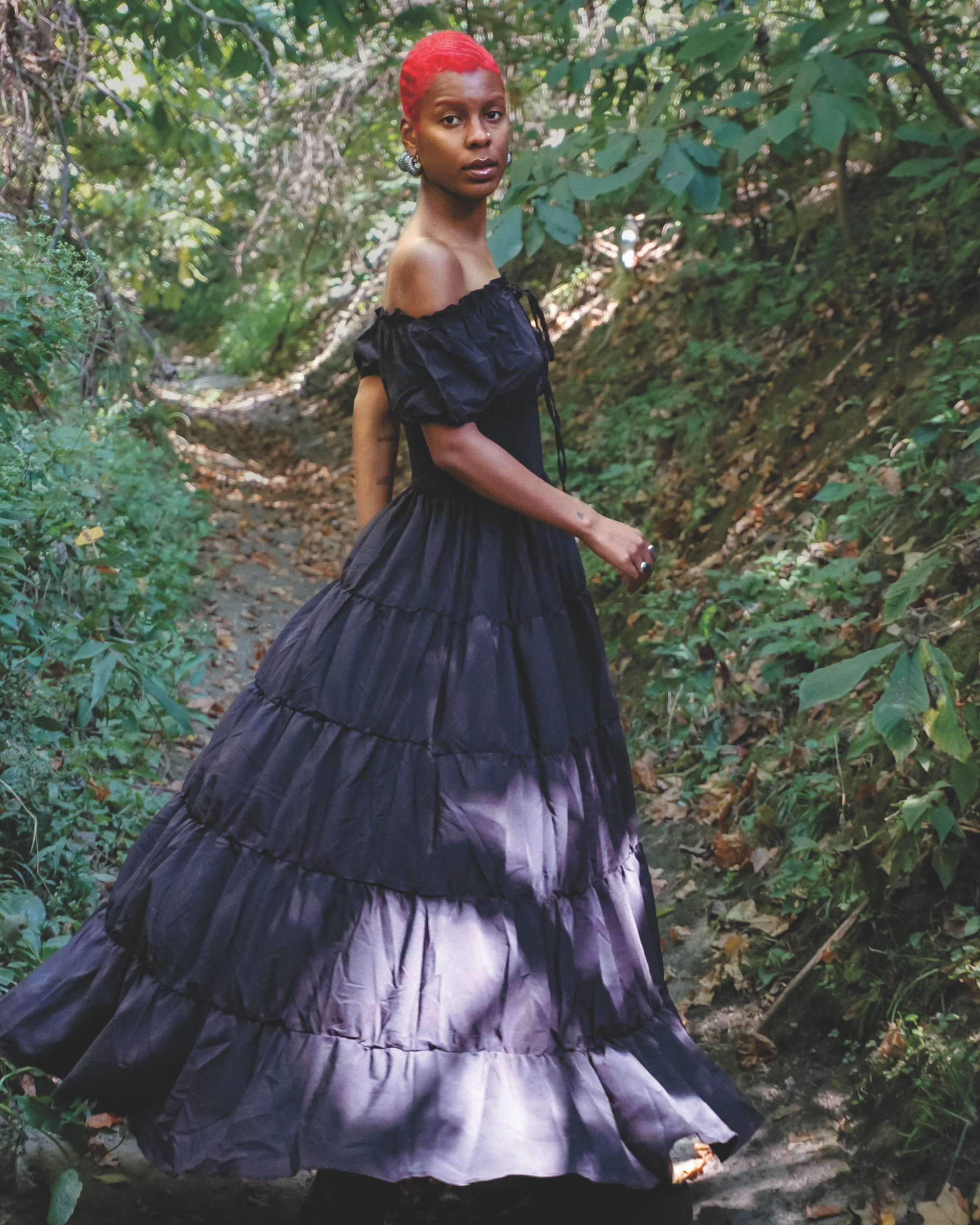
Talibah Safiya photograph by Anthony Lorenzo
Delicious (oxford american version)
TALIBAH SAFIYA
“In the alternate version included on the vinyl and playlist that accompany this issue, ‘Delicious’ is slower, sparser, and even more luxurious, centering Safiya’s tender clarity against subtle percussion and flute as she and the listener rest together in the moment. This new take was inspired by Safiya’s appearance at the 2024 event that announced the Oxford American’s Memphis-music issue and honored the legacy of Stax Records, another of Safiya’s creative wellsprings. This new, live-in-the-studio ‘Delicious’ emphasizes how—like aforementioned predecessors from Rainey to Badu—Safiya builds a connection with her audiences that makes the stage into its own space of sonic conjuring. At the center is her singing, as she travels around the smooth caress of the melody from low intimacy to trembling high notes. Outside of the crisp production of Black Magic, ‘Delicious’—like Safiya’s other songs—expands even further in the airy atmosphere of live performance, even as it retains the ‘deep exhale’ that Safiya seeks to share with her listeners in whatever moment and context they meet her...” (Read the extended liner note.)
—CHARLES L. HUGHES
WRITERS: Talibah Safiya, Madame Fraankie, Ari Morris
PUBLISHING: Koonchez
PERFORMED BY: Talibah Safiya, Madame Fraankie, Ekpe Abioto, Khari Wynn
Courtesy of Deep Water Media
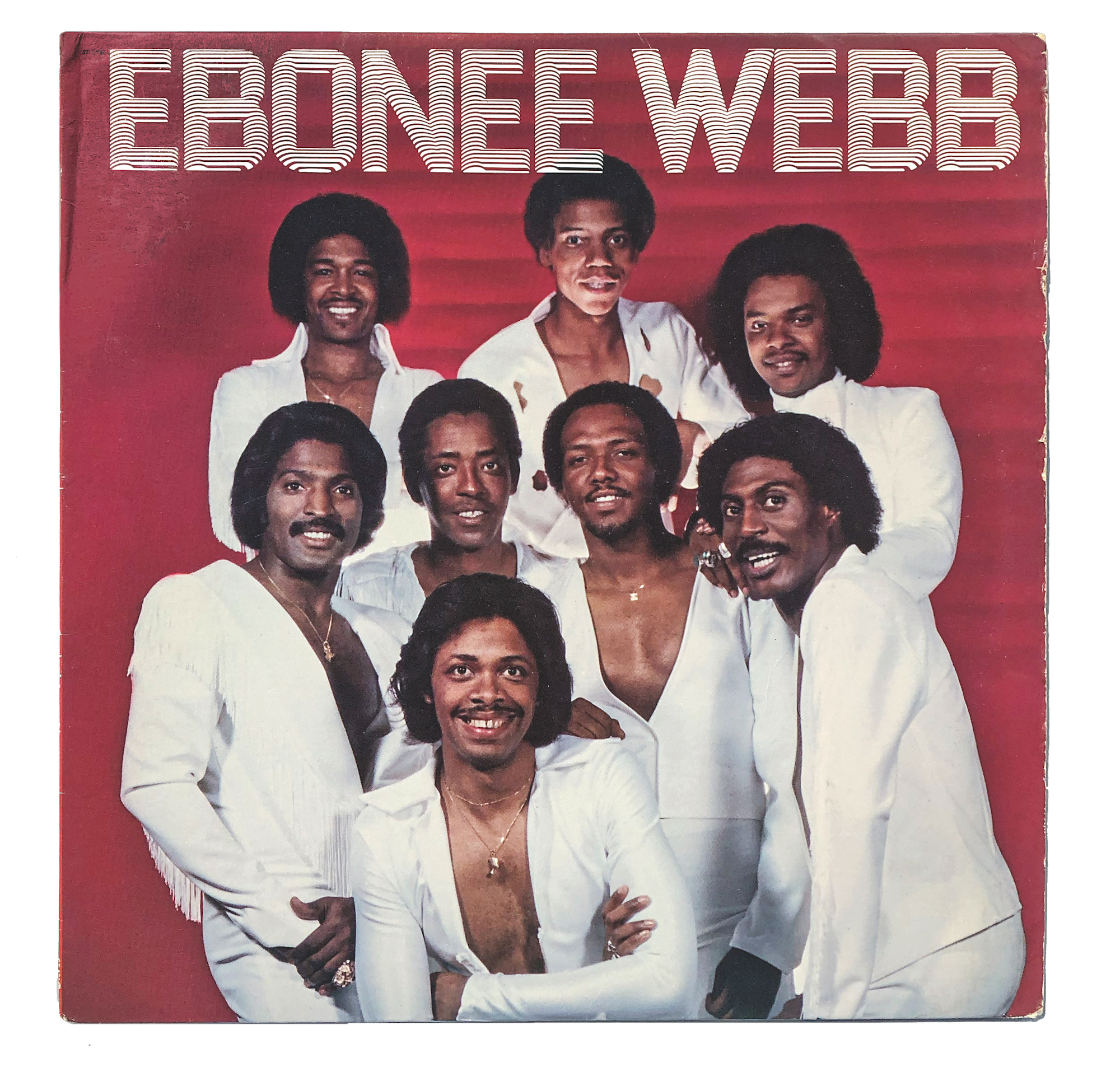
Ebonee Webb’s self-titled album. Photograph by Carter/Reddy
佐渡おけさ (Sado Okesa)
EBONEE WEBB
“Soon, [Ebonee Webb] recorded a second album for Seven Seas titled Memphis Soul Meets Japanese Folk Songs. Soaked in the sort of funky sophistication then associated with the likes of Earth, Wind & Fire or Weather Report, the album makes good on its very straightforward billing. Across its eight tracks, the band not only flexes their musical ability, but also delivers linguistically, performing Japanese lyricism over a disco-jazz bed. A cover of the Niigata Prefecture folk song ‘Sado Okesa,’ featured on this magazine’s companion LP, showcases that versatility. Ebonee Webb pairs what otherwise might’ve been a schmaltzy soprano saxophone solo in the song’s opening with a resounding harmonic vocal workout. By the climax of the composition, a symphony of rhythm guitar and dreamlike keyboards fuses together, forming an uncanny blend of synthetic and organic sound...” (Read the extended liner note.)
—JARED BOYD
Niigata Prefecture Folk Song
PERFORMED BY: Ebonee Webb
Courtesy of King Records Co., Ltd.
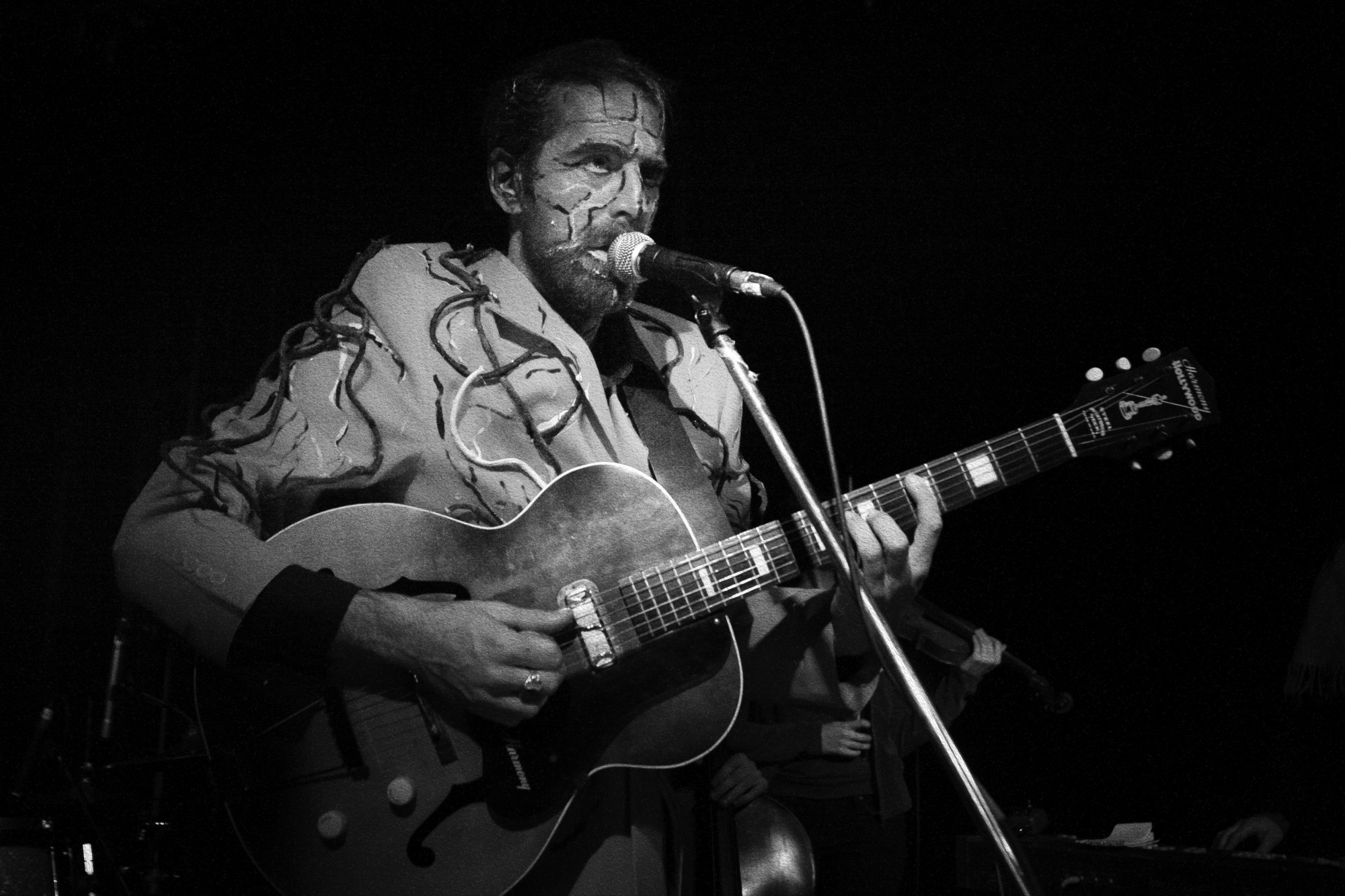
Harlan T. Bobo, photograph by BullyRook. Courtesy the artist
Must Be in Memphis
HARLAN T. BOBO
If we decide to process everything that Harlan T. Bobo sings on “Must Be In Memphis” as autobiographical, then the cult singer-songwriter once got deported from Sweden and was caught breaking the law in Spain. Whatever went down in New York City is so something—traumatic? humiliating? gross?—that he can’t stomach mentioning it. Still, the song suggests, none of that compares to the trouble he can find in Memphis at nighttime, city air thick with humidity and temptation. “I’ve been here five hours, made six bad decisions / Still got the rest of the night,” Bobo sings over barely-there strums, his weathered tenor befitting of a boozy, wee-hours sing-along. And later: “The things that I find fit to do in this town / would turn my poor mammy to dust.”
The song appears on Porch Songs, his stripped-back fifth full-length album, which was released in 2022 by Goner Records, a Memphis institution specializing in the underheard and underground. Despite understanding how often great storytellers approach a heightened version of truth by blending fiction with reality, and despite knowing Bobo’s specific penchant for persona and performance, it’s easy to listen and presuppose it’s all true—that Bobo was back in Memphis from his adopted home in France, back for one night in the city where he cut his teeth playing in bands in the ’90s, where he started performing his own songs and found a devoted fan base who understood his downcast confessionals. That he composed most of the song at a Memphis house party he wasn’t invited to, where he also gulped down stolen whiskey, stripped to his underwear, and tossed his guitar into a swimming pool. That sometimes even when everything’s wrong, it feels right.
WRITER: Harlan T. Bobo
PUBLISHING: 2022 harlantbobomusic (BMI)
PERFORMED BY: Harlan T. Bobo
Courtesy of Goner Records

V.C.R photograph by Brandon Hicks
wake up...
V.C.R
“Serving as an interlude on my LP The Chronicles of a Caterpillar, this siren call is a palate cleanser for the listener traveling through my mind. In fact, the whole album is a cerebral portrait. For ‘wake up…,’ I assembled two of my closest friends to narrate the journey: Ss. Sylver, a harpist and vocalist, served as siren one, and my best friend Victoria Janelle (also from Memphis) served as siren two. These two ladies knew the intimate context of the narration so they needed no coaching. Over a layer of harmonized angelic voices and harp trills, the sirens attempt to wake me up. Not only are they warning me, but they’re also encouraging the listener to transition into the second half of the project. The song has a similarly critical role on the compilation album that accompanies this magazine; it was selected to close out Side A, functioning as both a surreal outro and a lucid precursor...” (Read the extended liner note.)
—V.C.R
WRITER: Veronica Camille Ratliff
PUBLISHING: OGMUSE Publishing
MIXED/MASTERED BY: Swarvy
PERFORMED BY: V.C.R, Ss. Sylver (vocal & harp), Victoria Wright (vocal)
Courtesy of Leaving Records
Side B
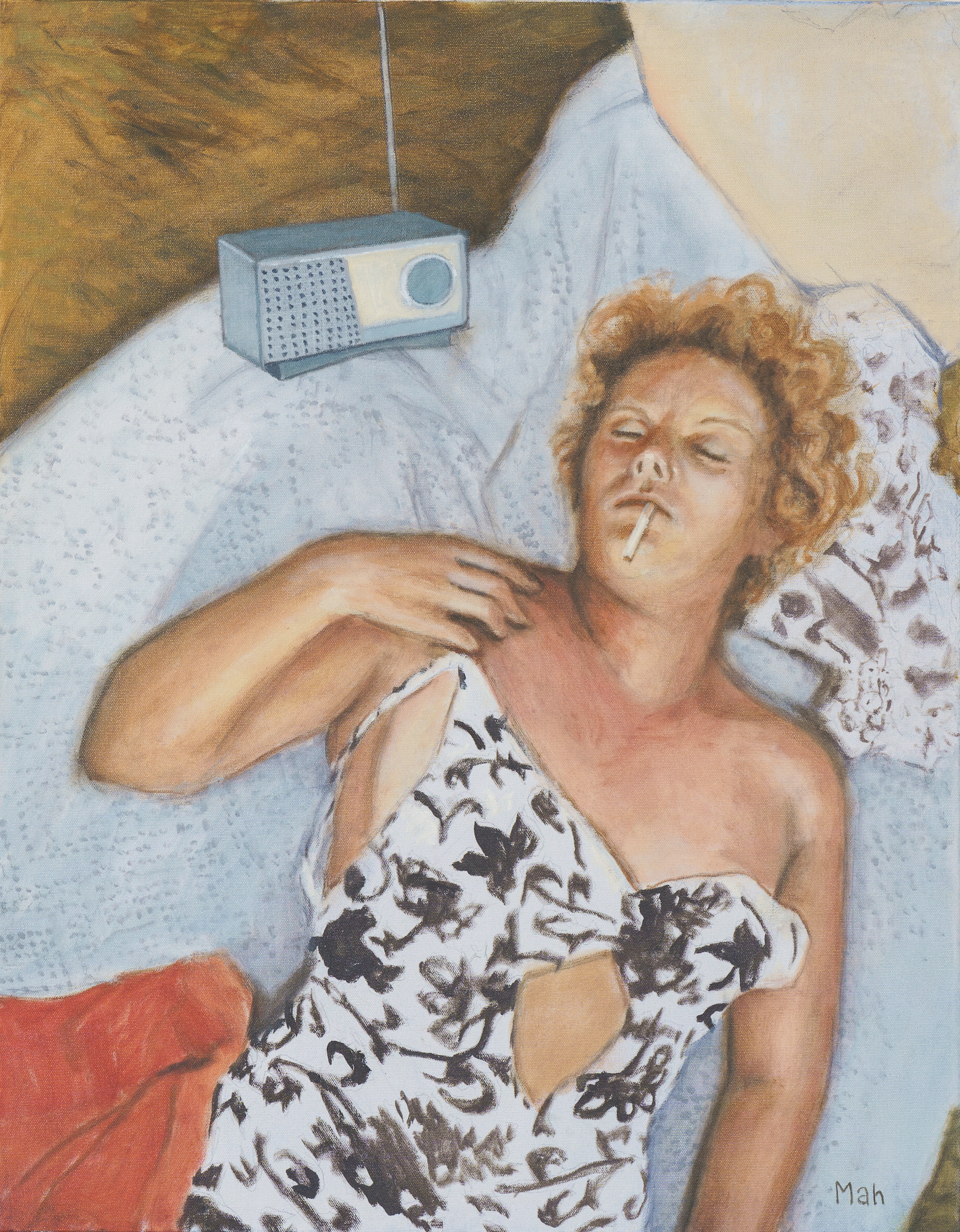
Cruel Summer, 2023, oil on canvas by David Mah. Courtesy the artist
Frank, This Is It
CLIFF JACKSON & JELLEAN DELK WITH THE NATURALS
“In 1969, the same year producer Shelby Singleton purchased the Sun label from Sam Phillips, Jerry [Phillips] produced ‘Frank, This Is It’ by Cliff Jackson & Jellean Delk with the Naturals, a tight, high-powered ensemble of local performers and studio guns. Together, they created one of the most thrilling, offbeat singles in the Sun Records catalog. The song is a kind of Mickey & Sylvia–style r&b duet, but with a twist.
It’s a one-sided conversation in which Delk is talk-singing, addressing a man named Frank (Jackson) and telling him in no uncertain terms: ‘Well, Frank, this is it. I’m through. I mean, like, I’ve had it. Five long, long miserable years… Cry, baby. Go on and cry.’ And in response, he does cry, sniffling and wailing to a deep, grooving rhythm track and sharp boogie-woogie piano fills...” (Read Harris Wheless’s Q+A with Jerry Phillips.)
—HARRIS WHELESS
WRITERS: Jerry Phillips, Edward M. LaPaglia, Oris Mays
PUBLISHING: Knox Music Inc.
PERFORMED BY: Cliff Jackson & Jellean Delk with the Naturals
℗ 1968 Sun Label Group, LLC. All rights reserved.
Courtesy of Sun Records and Primary Wave Music
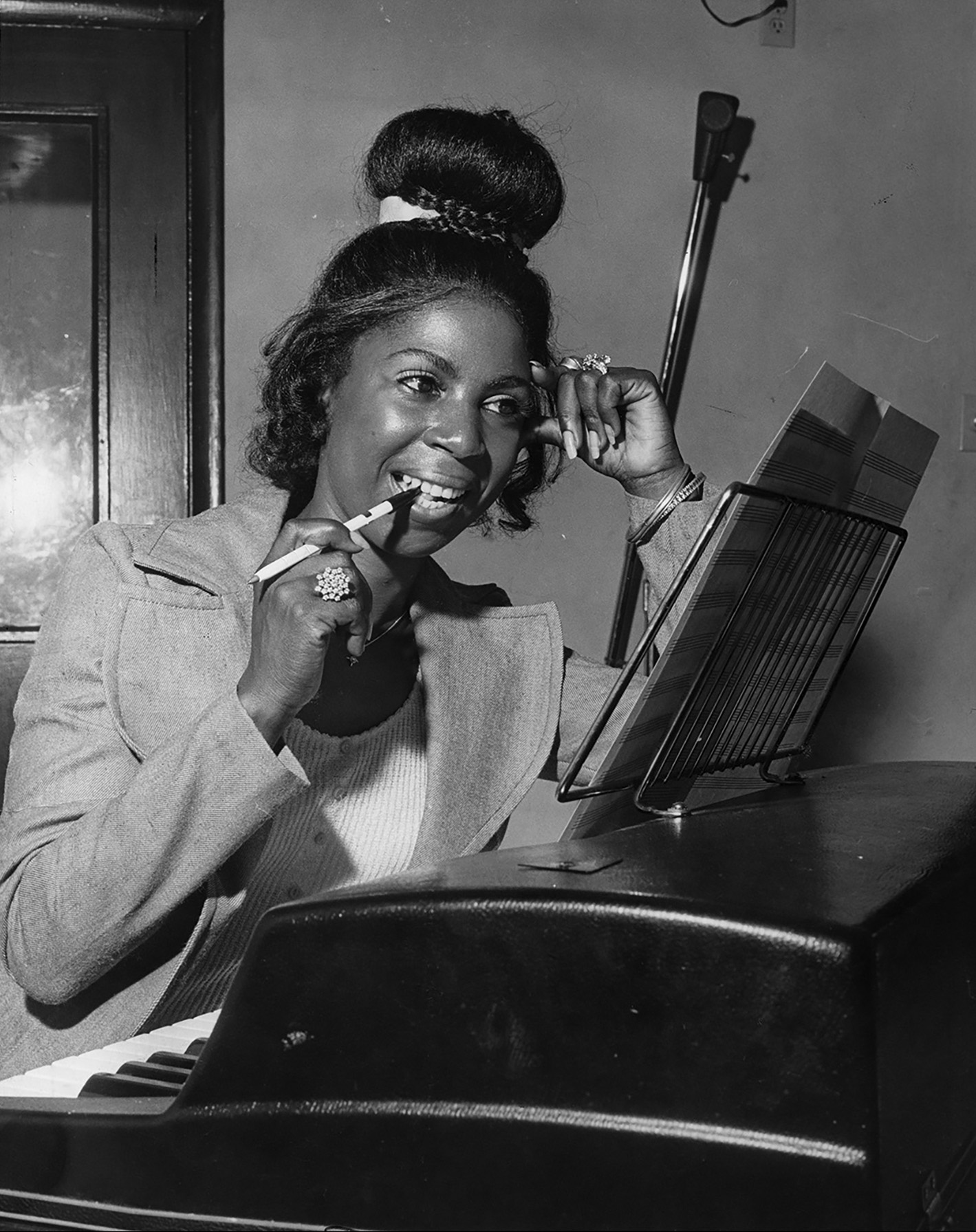
Bettye Crutcher, 1972. Photograph courtesy Memphis Press-Scimitar newspaper morgue, Special Collections Department, University of Memphis Libraries
Do You Want Me To Lie To You
(STAX SONGWRITER’S DEMO)
BETTYE CRUTCHER
“Listening to two of the twenty-three Crutcher-penned songwriting demos collected for the Grammy Award–winning compilation Written in Their Soul: The Stax Songwriter Demos, one would certainly disagree with Crutcher’s self-assessment. On ‘Too Much Sugar for a Dime,’ she is confident, is soulful, and means every damn word she sings. But the real proof is ‘Do You Want Me to Lie to You,’ an almost fully developed ‘demo’ recorded in 1974–75. It is a powerful blast of contemporary r&b: mature and nuanced, and written and performed from a man’s perspective. With a quick switch of pronouns, it could have been a hit for any number of mid-1970s Southern female r&b singers...” (Read the extended liner note.)
—JEFF KOLLATH
WRITER: Bettye Crutcher
PUBLISHING: Irving Music, Inc.
PERFORMED BY: Bettye Crutcher
Courtesy of Craft Recordings, a Division of Concord
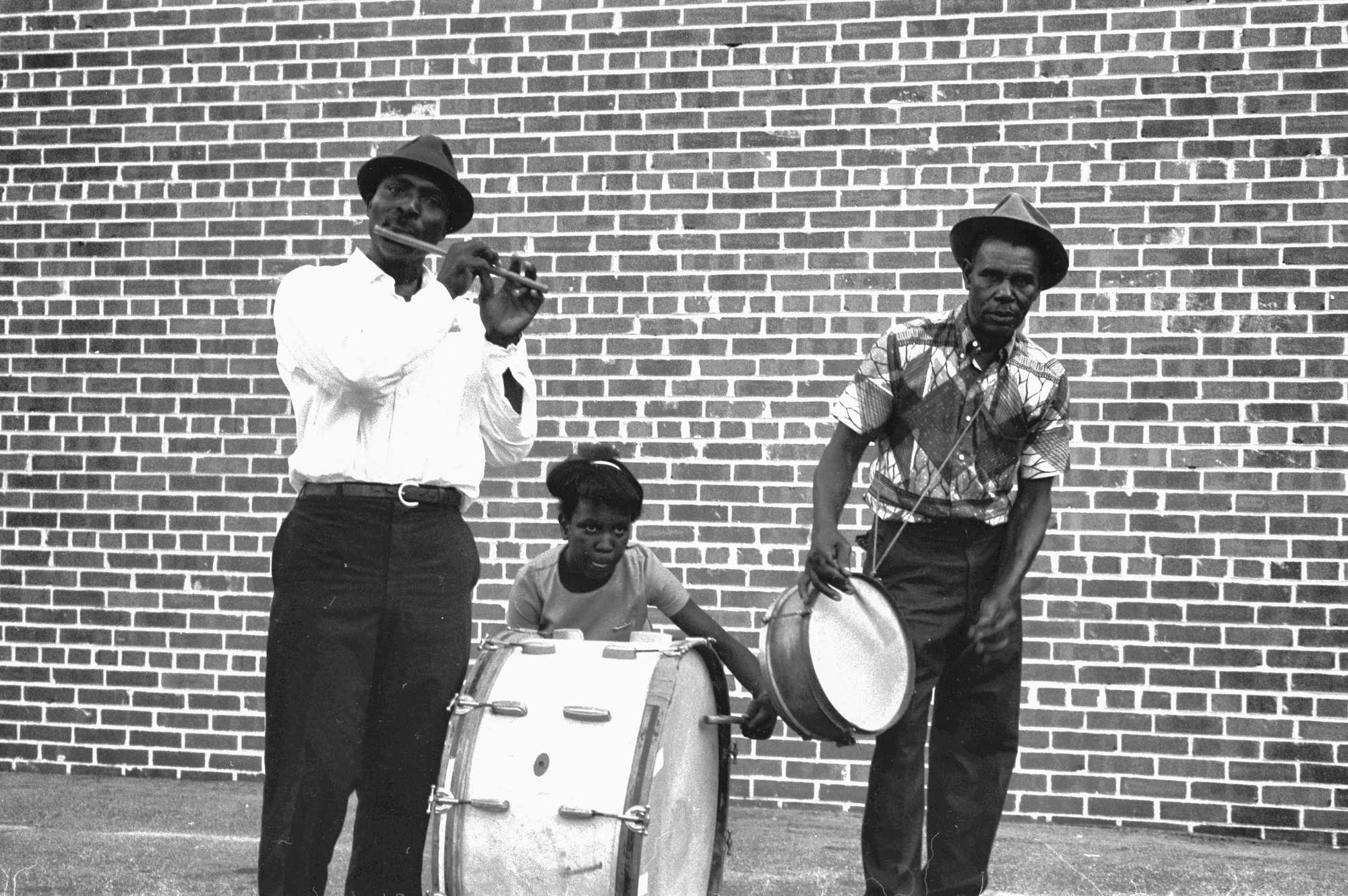
Left to right: Napoleon Strickland, unidentified woman, and Otha Turner in Memphis, 1969, photograph by Chris Strachwitz. Courtesy the Arhoolie Foundation
Back Water Rising
(from the ’69 memphis blues festival)
NAPOLEON STRICKLAND WITH THE COMO DRUM BAND
Over two hot nights in June 1969, the fourth and final Memphis Country Blues Festival crammed some of the city’s most legendary players into the Overton Park Shell. Rufus Thomas & the Bar-Kays were there, as was Napoleon Strickland, up the forty-some miles from Como, the small town in the Mississippi Hill Country where he had made his name leading fife-and-drum bands. For many in the crowd, it was likely their first time hearing fife-and-drum, the high-energy, polyrhythmic dance music that was a popular soundtrack for Labor Day picnics in rural Black communities in the Hill Country and beyond. Strickland had first been recorded only two years earlier by researcher George Mitchell. For white listeners like Mitchell and Arhoolie Records founder Chris Strachwitz, who recorded Strickland performing this track at the festival, fife-and-drum was a curiosity, an “unusual” and “primitive” outlier to the image of Black rural music they were constructing. And while they championed the music and worked to archive it, their liner notes and field reports seem to miss the living community lineage that surrounded fife-and-drum and that would influence Memphis music for generations to come. George Mitchell’s recording trip to Como, for example, caught not only Strickland’s playing, but also a young Jessie Mae Hemphill playing bass drum in her grandfather’s fife-and-drum band. This recording of “Back Water Rising,” its relentless groove echoing around Overton Park, showcases three generations of players from the area around Como: Strickland on fife; Otha Turner, Strickland’s mentor, on snare; and a different young woman on bass drum, whose name Strachwitz didn’t manage to catch.
WRITER: Napoleon Strickland
PUBLISHING: BMG Bumblebee / Tradition Music Co.
PERFORMED BY: Napoleon Strickland with the Como Drum Band from the recording Mississippi Delta Blues Jam In Memphis, Vol. 1, ARH00385
℗ 1993. Used by permission.
Courtesy of Smithsonian Folkways Recordings

Jessie Mae Hemphill at the Northeast Mississippi Blues and Gospel Folk Festival, Rust College, Holly Springs, MS, 1989. Photograph by David Evans
Tell Me You Love Me
JESSIE MAE HEMPHILL
On “Tell Me You Love Me,” the country blues musician Jessie Mae Hemphill petitions for a declaration of unconditional affection. The titular request doesn’t come off like a demand or an ultimatum so much as a dare, a playful plea to articulate something that both singer and subject understand to be true. Delivered with Hemphill’s inimitable North Mississippi diction, the lyric sometimes sounds like “damn, you love me,” especially on this quick-tempoed 1988 version, which was recorded at Memphis’s Ardent Studios and produced by the ethnomusicologist David Evans. The potential mishearing has little impact on the song’s narrative stakes, because the existence of love was never truly in question. She can see it in his eyes.
Not all of Hemphill’s music is feel-good, but this clarity—of emotion, of intention—is a hallmark. You’ll find it in her no-nonsense poetry, or in the short guitar phrases that she loved to loop across entire songs, rhythm and repetition inextricable from expression. “As soon as I sing that first verse, another one be there like somebody be writin’ it on the wall for me,” she explained. “I keep on singin’ and pickin’, and the tune of the song be right there, too.” Some of her intuitive thinking can surely be traced back to a musical childhood in the Mississippi hills, where creative confidence was encouraged by like-minded family, including the seminal fife-and-drum bandleader Sid Hemphill, her “Grandaddy.”
Hemphill spent a good chunk of her adult life in Memphis, writing and recording and performing and living. Her acclaimed late-twentieth-century output, including “Tell Me You Love Me,” helped re-energize the long tradition of rural sounds contributing to the city’s sonic identity. Hemphill died in 2006, but her influence on Memphis music is specific, ongoing, and sometimes overlooked; disparate tracks by Talibah Safiya and Lorette Velvette, both featured alongside Hemphill on the compilation record that accompanies this issue, exist in conversation with her sound and legacy.
—PATRICK D. McDERMOTT
WRITER: Jessie Mae Hemphill
PUBLISHING: Music River Publishing
PERFORMED BY: Jessie Mae Hemphill
Courtesy of Highwater Records / University of Memphis
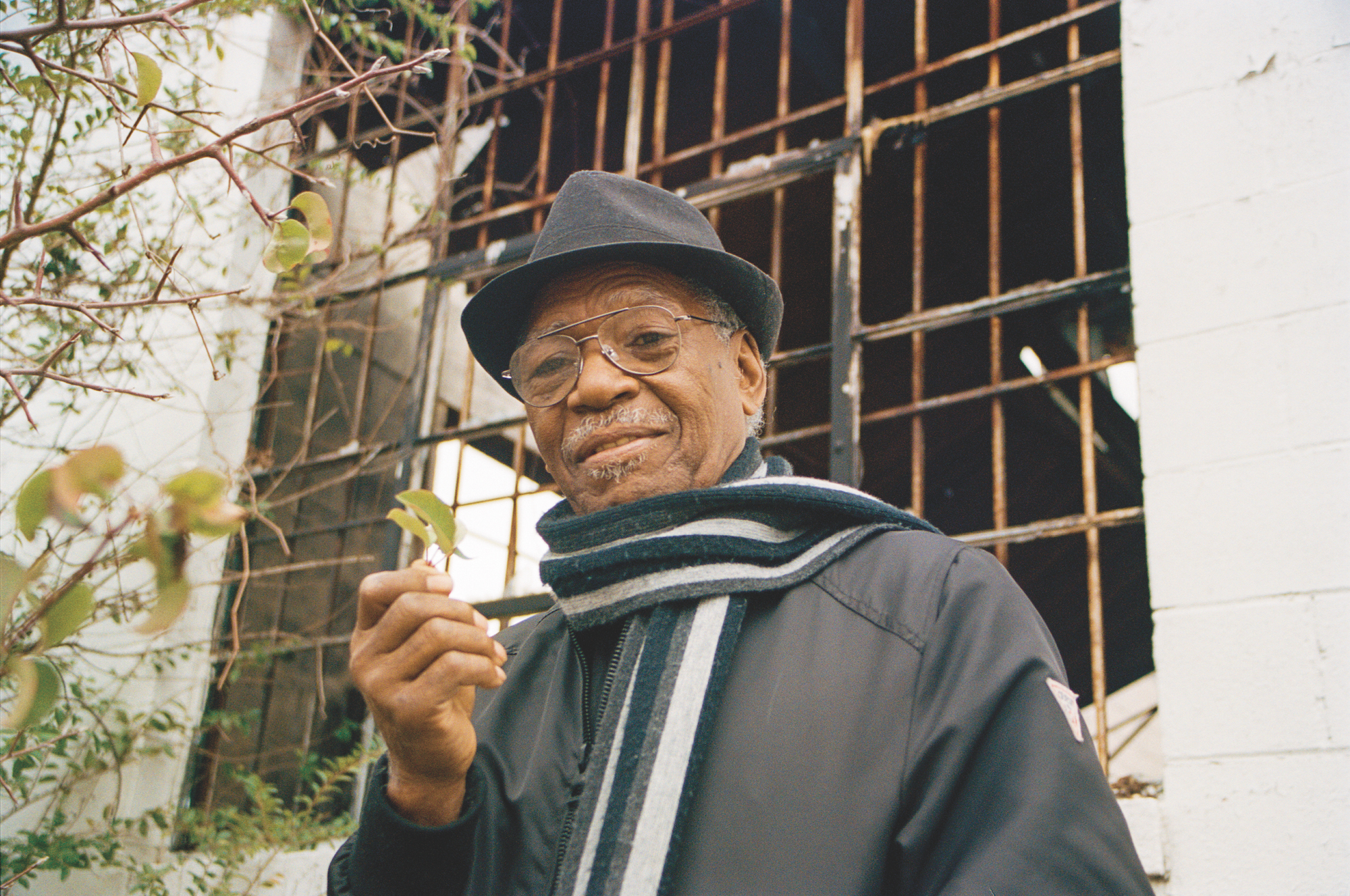
Don Bryant, photograph by Lawrence Matthews. Courtesy Fat Possum Records
Your Love Is Too Late (live)
DON BRYANT & THE BO-KEYS
When Don Bryant’s vocal enters above the fray of the Bo-Keys and members of the Memphis Symphony Orchestra on “Your Love Is Too Late,” it does so in a manner that requires the appellation “rhythm and blues” to be fully spelled out, as the neologism “r&b” doesn’t quite fit. His voice is a living vestige of a time when the genre distinctions between blues, soul, and r&b were much muddier. The Bo-Keys keep up a woozy, full-bodied, blues-freighted propulsion behind him throughout the performance.
In the song’s lyrics too, you can find remnants of the blues. Here, heartache is the central theme, a fixation that has bewitched songwriters as long as the pain of love lost has existed. Bryant growls defiantly, admonishing a former lover for returning only now that he’s moved on.
This recording highlights the energy of Bryant’s live performances, offering listeners the bite of his voice. There’s open air around the microphone, and shouts of exaltation from the audience. Though recorded at Memphis’s Crosstown Theater in 2021, you can almost feel the glinting stage lights of a darkened room on Beale Street.
—FREDERICK McKINDRA
WRITERS: Christopher Scott Bomar, Don Bryant
PUBLISHING: © Eliminator Music (BMI) / Dawn Akil Music (BMI), administered by Downtown DMP Songs (BMI)
PERFORMED BY: Don Bryant & the Bo-Keys (Scott Bomar, David Mason, Joe Restivo, Archie Turner, Marc Franklin, Kirk Smothers, Art Edmaiston)
Courtesy of Electraphonic Recording, LLC
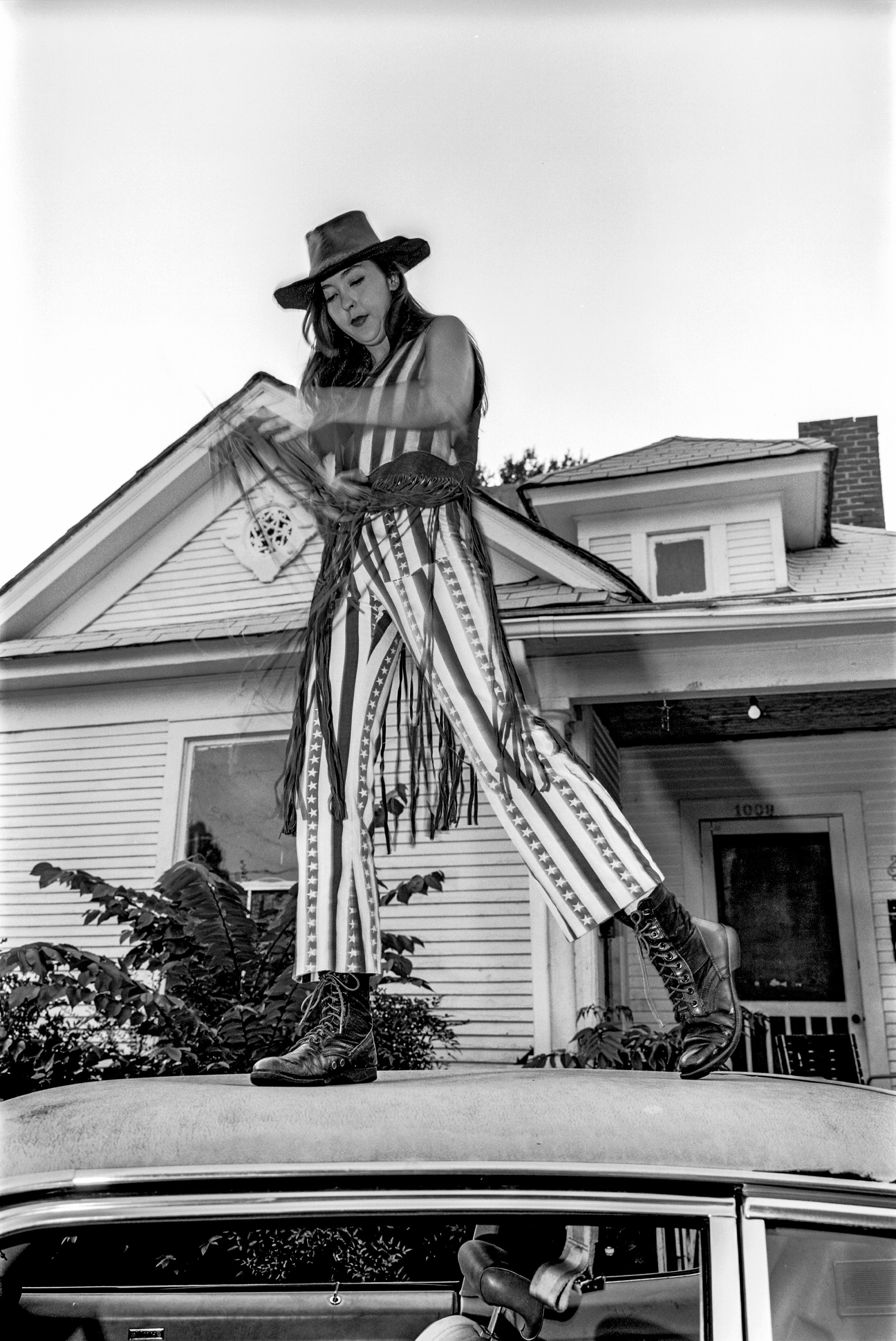
Lorette Velvette photograph by Trey Harrison
Eager Boy
LORETTE VELVETTE
“Velvette spent the ’80s backing Falco in Panther Burns (and the Burnettes) and co-fronting an all-girl group called the Hellcats—all of whom were rip-roaring singers and players. When that band dissolved, she toured Europe as part of a lineup with Townes Van Zandt and Alex Chilton at the top of the bill and Memphis oddballs the Country Rockers near the bottom, and she can still regale you with wild stories of early-morning drinking jags and back-of-the-bus poker games. When a German label expressed interest in releasing a Lorette Velvette solo album, she sheepishly asked Chilton if he would produce it, not expecting him to actually say yes. ‘What he did was, he brought a set of drums and a bass to my little duplex. I already had a piano and a guitar. He showed me how to use a four-track recorder to make some demos, and that was the basis of that first CD.’ That was 1993’s White Birds, which includes Velvette’s ode to Memphis ‘Godforsaken Town,’ her cover of Burnside’s ‘Going Down South,’ and one of her finest songs, ‘Eager Boy.’
Featuring Chilton playing bass, ‘Eager Boy’ is a blues plaint dressed up as a sloppy rockabilly toss-off, with Velvette’s guitar constantly steering against the skid of the groove and interrupting her vocal: a devil on her shoulder. She injects every lyric with a casual, almost sarcastic lust, conveying as much of the story in her sighs and caterwauls as she does in the words themselves. But the words themselves contain so many fraught blues images you might suspect the song’s a cover rather than an original. ‘Awwww eager boy in the backseat of my V8 Ford,’ she moans. As soon as she finishes this song, she’s climbing back there with him...” (Read the extended liner note.)
—STEPHEN DEUSNER
WRITER: Lorette Velvette
PRODUCED BY: Alex Chilton
PERFORMED BY: Lorette Velvette
Courtesy of Lorette Velvette

Julien in the flowers, October 2017, photograph by Jay Leiby. Courtesy the artist
Mental Math
JULIEN BAKER
“Baker is a serious person and artist who has suffered and struggled and written music about those experiences, but to determine, as one Pitchfork critic did, that her ‘music is all calamity’ seems to ignore her wit. That was the Pitchfork reviewer’s opening salvo in writing about the B-Sides EP, recorded during the sessions for 2021’s Little Oblivions and on which ‘Mental Math’ appears. As an example of her ‘jarring images’ of that calamity, the reviewer quoted these lines from ‘Mental Math’: ‘Hanging on a ledge, outside of your house / Trying not to freak out, staring at the ground / Doing math in my head, how far is it down?’ To me, the image is not ‘jarring’ but classic comedy, Harold Lloyd hanging from a clock hand, high above a city street. Danger and ridiculous thoughts coexisting simultaneously. Obviously you have to do mental math because you’re dangling from a ledge and can’t hold pencil and paper! Comedy and calamity hang together...” (Read the extended liner note.)
—JAY JENNINGS
WRITER: Julien Rose Baker
PUBLISHING: Kobalt Music
PERFORMED BY: Julien Baker
Courtesy of Matador Records
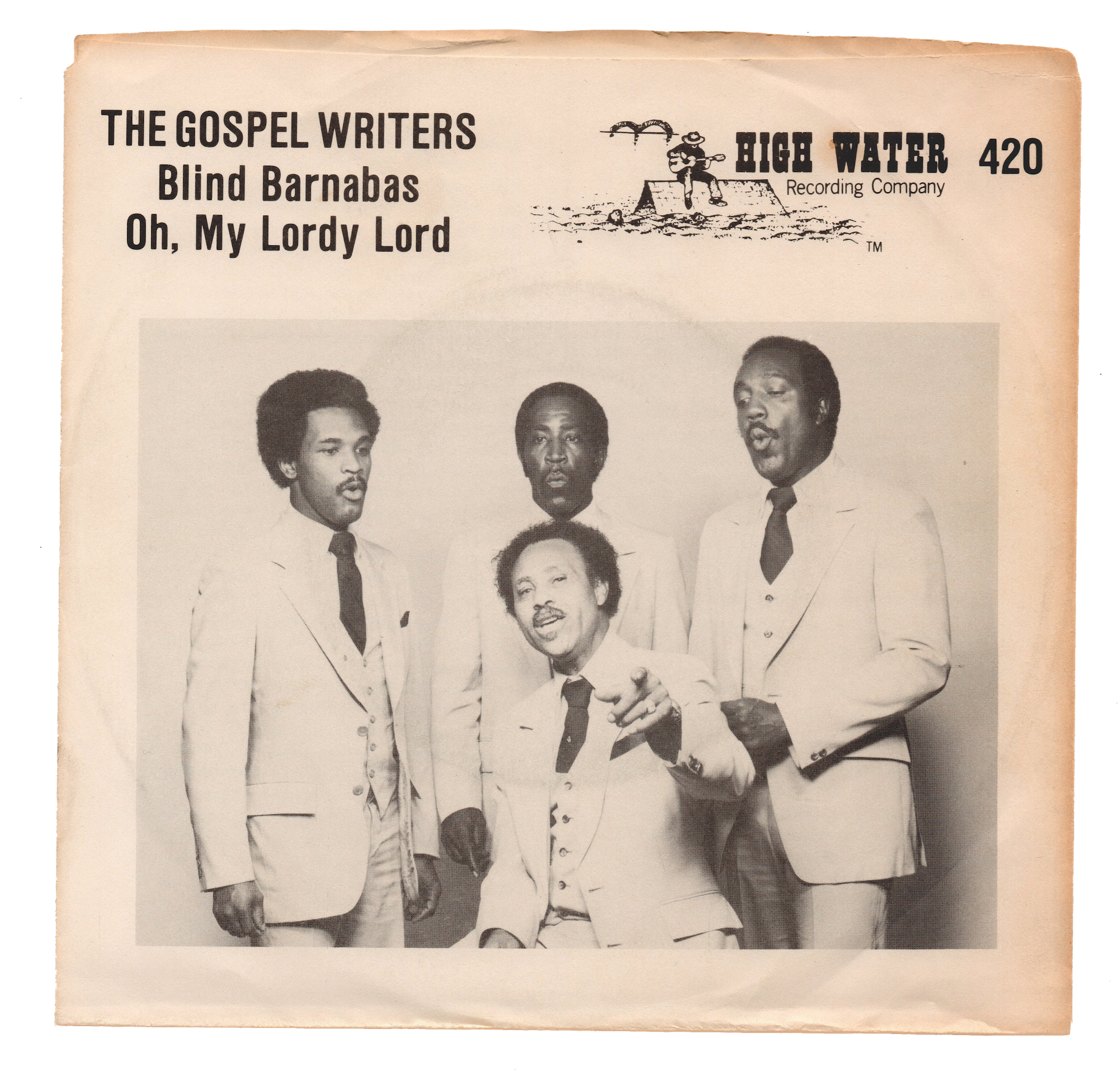
Photograph by Tom Wofford, Memphis State University Photo Services for High Water. Courtesy High Water Records
New Born Soul
GOSPEL WRITERS
This stripped-down, a cappella version of the gospel standard “New Born Soul,” performed over the years by the Blind Boys of Alabama, Shirley Caesar, and James Cleveland, among others, serves as a kind of gospel primer. (Read Robert F. Darden on Gospel’s Memphis Soul.) There’s the harmony achieved among the singers—tenors Willie Wilson Jr. and David Ward, baritone Kevin Lott, and bass Jesse Allen—each confident in holding his own note. There’s the staccato syncopation in the phrasing of the lyrics, so sharply defined that the voices rival the snap of a drum set.
And then there’s lead singer George Rooks, whose ecstatic, barely contained voice soars across the landscape laid by the four other vocalists. The repetition of the long ooo sound in the rhyming lyric “My hands look new, my feet did too / My head got wet in the midnight dew” feels like a classic convention of gospel sentiment and sound, the singers’ voices dropping out after each phrase, only to build again, like a childhood singsong.
There’s really no need for instrumentation on this track. Not even for hand clapping or foot stomping. The singing is so dynamic, it’s all that’s necessary to express these rapturous notes of praise.
Traditional
PERFORMED BY: Gospel Writers
Courtesy of Highwater Records / University of Memphis
